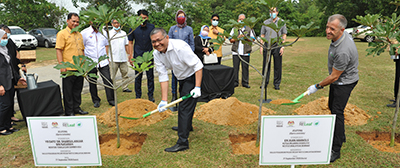
YB Dato’ Dr Shamsul Anuar bin Hj Nasarah and Mr Juan Aranols marked the start of Project RELeaf with the planting of Jelutong trees
Nestlé announced its commitment to plant three million trees in the next three years through Project RELeaf, a reforestation initiative in Malaysia contributing to the company’s global pledge to achieve Zero Net Greenhouse Gas Emissions by 2050. Source: Timberbiz
Project RELeaf builds on the pioneering Kinabatangan Rileaf Project, established by Nestlé in 2011, and which helped plant one million trees in Sabah.
By widening its reach in Sabah and expanding for the first time to Peninsular Malaysia, Project RELeaf aims to scale up Nestlé’s efforts to restoring riparian and forest ecosystems, contributing to establish wildlife corridors and mitigate human-animal conflict, and protecting critical water supplies.
The project will also help to develop greater awareness amongst local communities on environmental topics and will provide additional sources of income to improve their livelihoods.
“We are mindful of the urgent need to address climate change, which is a threat to the sustainability of our business as well as for the planet’s future. Project RELeaf will enable us to accelerate our net-zero ambition by scaling up nature-based solutions to tackle this global climate issue. Not only will Project RELeaf enhance biodiversity, but it will subsequently help to absorb carbon emissions,” said Chris Johnson, Executive Vice President Nestlé SA, Chief Executive Officer, Zone Asia, Oceania and sub-Saharan Africa.
“Planting trees in areas connected with the sourcing of our ingredients contributes to the responsible management of our supply chain. Furthermore, reforestation complements our efforts to halt deforestation in our supply chains.”
Nestlé Malaysia will plant three million trees across the Kinabatangan Wetlands and Merisuli Forest Restoration areas in Sabah, as well as in forest reserves along the Central Forest Spine in Peninsular Malaysia.
These forest reserves provide sanctuary for a great diversity of flora and fauna, including threatened wildlife such as orangutans, proboscis monkeys, Asian elephants, Malayan tigers, sun bears and tapirs.
Nestlé will collaborate with the Malaysian Ministry of Energy and Natural Resources, the Sabah Forestry Department, Malaysian Nature Society, the Tropical Rainforest Conservation and the Research Center, Kinabatangan Orangutan Conservation Project, palm growers, as well as local communities and entrepreneurs for community-based seedling production and tree-planting operations.
The launch of Project RELeaf was officiated by YB Dato’ Dr. Shamsul Anuar Bin Hj Nasarah, Minister of Energy and Natural Resources and Mr. Juan Aranols, Chief Executive Officer, Nestlé (Malaysia) Berhad. The event took place at Taman Rimba Alam, Precinct 15, Putrajaya.
“Malaysia has been blessed with abundant natural resources. We are committed to maintain at least 50% of the country’s land area with forest and tree cover in line with our pledge at the Earth Summit in Rio de Janeiro 1992. As our nation develops, we must balance our growth with the conservation of our environment,” said YB Dato’ Dr. Shamsul Anuar Bin Hj Nasarah.
“As such, we are truly appreciative of Nestlé’s committed efforts to protect our nation’s biodiversity. We hope to see more public and private sector collaborations, to continue protecting our precious ecosystem for future generations.”
Mr Juan Aranols said: “Nestlé’s pledge to achieve zero net greenhouse gas emissions by 2050 reflects our ambition to contribute to a greener future. Project RELeaf, here in Malaysia, is a tangible step towards helping us realize this ambition.
“By restoring critical forest ecosystems, we will help to preserve ecosystems and protect biodiversity. These are vital to ensure supply chain sustainability while protecting the environment, as both elements are interconnected in nature. That will enable us to continue making a positive impact for both the planet and for people, as we will continue to empower local communities and support livelihoods via purchasing of seedlings and their involvement in planting activities.”







